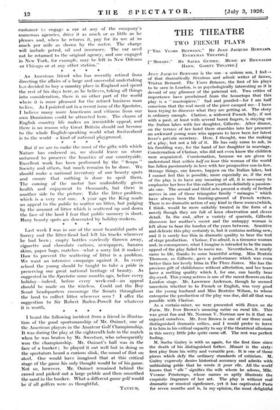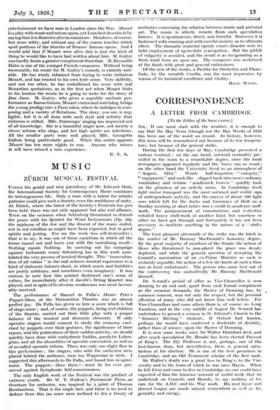THE THEATRE
TWO FRENCH PLAYS
[` THE YEARS BETWEEN." BY JEAN JACQUES BERNARD( EVERYMAN THEATRE.] ['MOZART." By SACIIA GU1TRY. MUSIC BY REI-NALDO HAHN. GAIETY THEATRE.] JEAN JACQUES BERNARD is the son—a serious son, I feel— of that dramatically frivolous and adroit writer of farces, Tristan Bernard. The Years Between, the first of his plays to be seen in London, is as psychologically interesting as it is devoid of any glimmer of the paternal wit. Two critics of importance have proclaimed from the housetops that this play is a "masterpiece." Sad and puzzled—for I am half conscious that the real merit of the piece escaped me—I have been trying to discover what they are getting at. The story is ordinary enough. Clarisse, a widowed French lady, if not with a past, at least with several burnt fingers, is staying on the Italian lakes with- her daughter, Gilberte. After dinner, on the terrace of her hotel there stumbles into her presence an awkward young man who appears to have been her latest lover's private secretary. Here, I thought, was the making of a play, but not a bit of it. He has only come to ask, in his fumbling way, for the hand of her daughter in marriage. Consternation of Clarisse, who did not even know the children were acquainted. Consternation, because we are given to understand that within half an hour this woman of the world has fallen passionately in love with her prospective son-in-law. Strange things, one knows, happen on the Italian lakes, but I cannot feel this is possible; more especially as,. if the rest of the play is to have any meaning at all, it is necessary to emphasize her love for this callow youth as definitely a passion- ate one. The second and third acts present a study of fretted nerves in one of those triangular family " menages " which have always been the hunting-ground of French writers. There is no dramatic action of any kind in these scenes (which, I think, would be more suitably treated in the form of a novel) though they are full of keen observation and clever detail. In the end, after a variety of quarrels, Gilberte discovers her mother's secret and the unhappy woman is left alone to bear the burden of the years between. Sensitive and delicate this play certainly is, but it contains nothing new, and it is surely too thin in dramatic quality to bear the test of stage production. Clarisse, I'm afraid, is a tiresome woman and, in consequence, what I imagine is intended to be the main appeal of the play failed to move me. Nevertheless, it nearly came to life, thanks to some beautiful acting. Miss Beatrix Thomson, as Gilberte, gave a performance which was even better than her lovely Irina in The Three Sisters. She has the precious gift of childishness without affectation, and her tears have a melting quality which I, for one, can hardly bear dry-eyed. This young actress is one of the rarest flowers on the London stage. Mr. Lawrence Anderson, though he seemed uncertain whether to be French or English, was very good as the young husband and Miss Beatrice Wilson, to whose enterprise the production of the play was due, did all that was possible with Clarisse.
As a curtain-raiser, we were presented with Down. on the Farm, Mr. Ivor Brown's amusing satire on rural life. This was great fun and Mr. Norman V. Norman saw to it that we enjoyed ourselves. Mr. Ivor Brown is one of our three most distinguished dramatic critics, and I would prefer to leave it to him in his critical capacity to say if the theatrical allusions in this merry little joke quite came off. The rest was perfect
fooling. . .
- M.- Saeha Guitry is with us again, for the first time since' the death of his distinguished father. Mozart is the sixty-. first.play from his witty and versatile pen. It is one of those pieces which defy the ordinary standards of criticism. M.- Guitry expressly denies historical- accuracy and admits with unblushing pride- that he wrote it Pour elle. All the world. knows that " elle " signifies the wife whom he. adores, Mlle. Yvonne Printemps, whose names so aptly illustrate the exquisite fragrance of her art. The play is without real dramatic or musical signficance, yet it has captivated Paris for seven months and is, in my opinion, the most delightful. entertainment we have seen in London since the War. Mozart Is a play with music and not an opera, yet I can best describe it by saying that it is Rosenkavalier in miniature. Slenderer, of course, but more witty, and without any of the coarse touches which spoil portions of the libretto of Strauss' famous opera. And I would add that if Mozart were alive this is just the kind of thing he would like to have had written about him. M. Guitry can hardly desire a greater compliment than that. M. Reynaldo Hahn is one of the younger French composers. Without being Memorable, his music for M. Guitry's comedy is entirely suit- able. He has wisely refrained from trying to write imitation Mozart, and has trusted to his own lyric sense. Very skilfully, and not too often, he has embellished his score with real Mozartian quotations, as in the first act when Mozart hints to his hostess the music he is going to write for the story of on Juan. M. Guitry, who gives a superbly sardonic per- formance as Baron Grimm, Mozart's tutor and watchdog, brings the young prodigy into a Paris salon, where he indulges in com- posing and a variety of flirtations. The story, you see, is neg- ligible, but it is all done with such style and artistry that Criticism is stifled. 1Ville. Printemps' singing has improved out of all knowledge. She is a beautiful singer now, not merely a clever actress who sings, and her high spirits are infectious. All the smaller parts were well played, Mlle. Georgette ipallois being particularly good. When this notice appears Mozart has ten more nights to run. Anyone who misses it will have missed a rare experience.
E. S. A.











































 Previous page
Previous page